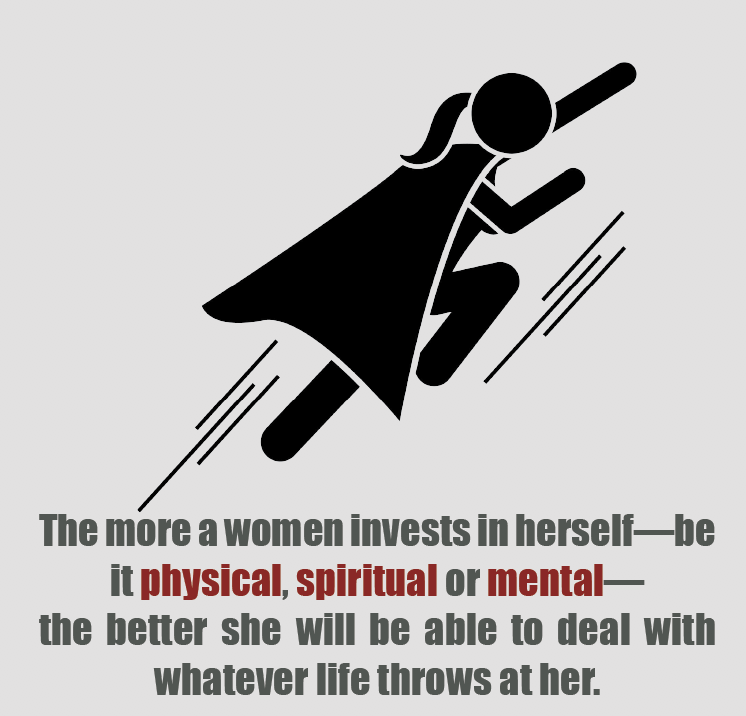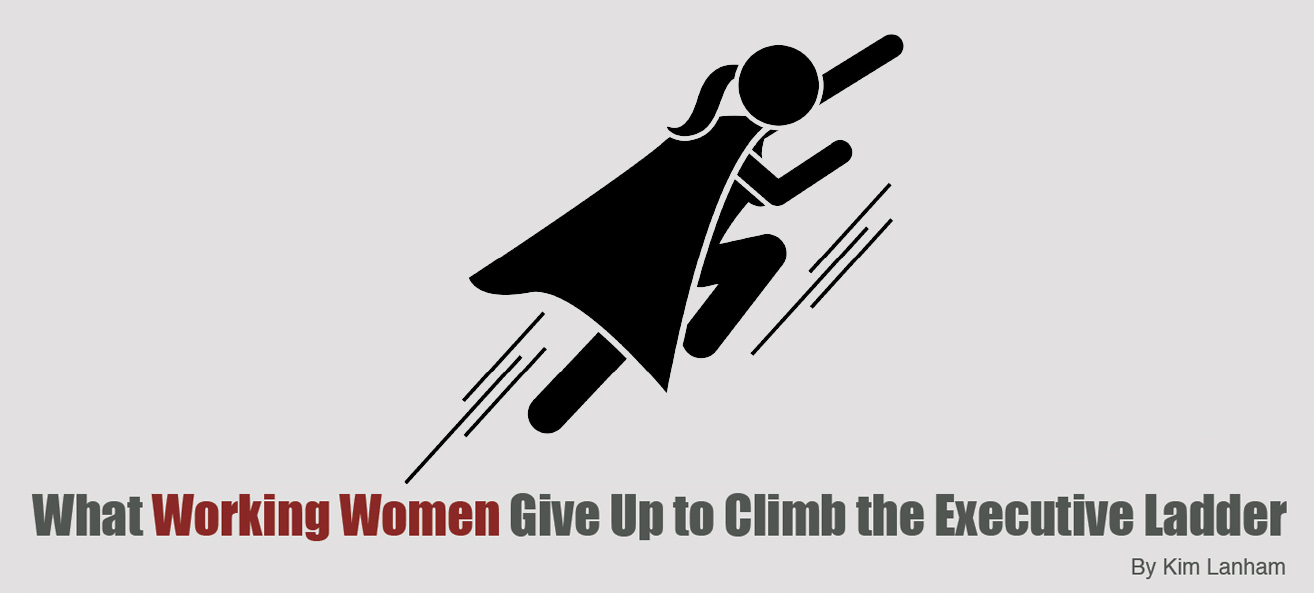 Professional and high-achieving working women have to give up a lot to climb the executive ladder. What does it mean to sacrifice and what are those things that are sacrificed in the pursuit of the executive woman’s life?
Professional and high-achieving working women have to give up a lot to climb the executive ladder. What does it mean to sacrifice and what are those things that are sacrificed in the pursuit of the executive woman’s life?
According to definition.com, sacrifice is the “forfeiture of something highly valued for the sake of one considered to have a greater value or claim.” From this context, working women are giving up things they highly value for their careers in which they feel are of greater value. What are the things that are given up or forfeited? The biggest one is relationships: relationships with themselves, spouses, children and friends.
There is still great societal expectations, or perceived expectations women place on themselves, to be a great wife, mother and maintain the household. In order to do all of the above and work a demanding career, something is bound to be lost or sacrificed for what is believed to be the greater good to the family or individual.
Women and the Second Shift
When the paid workday ends, the non-paid day begins and this can be taxing on an already jammed-packed day. According to salary.com’s “What’s a Working Mom Worth” 2016 survey, women spend an additional 59 hours per week working on the household. Part of the problem is that the husbands have not picked up a large enough portion of the traditional household responsibilities.
This rings true for even some of the highest-achieving executive women. Statistics from the National Parenting Association show that only 9 percent of their husbands take responsibility for meal preparation, 10 percent for the laundry and 5 percent for cleaning the house. When you throw children in the mix, it does not get better: only 9 percent take off work when the children are sick, 9 percent take the lead in helping with homework and a meager 3 percent help plan activities. With the expectations for women to be able to have it all, the balance can be more than overwhelming, and the fear of failure by asking for help compounds it all.
Women and Marriage
A Harvard Business study reveals that when it comes to high-achieving women, the inequality continues compared to high-achieving men. High-achieving men do not seem to struggle with, or sacrifice nearly as much, as women do. If a high-achieving man wants to get married and have children, the more likely he will be to find a suitable spouse and become a father.
In addition to the challenges faced by both men and women in advancing careers— working long hours, pressures and demands of the job— women have their own set of challenges. Most women, especially ones in high-achieving jobs, find it difficult to be married. Although things are changing, it is often the pre-condition for having children. With high-achieving women, the trend to marry later in life leaves a smaller pool of eligible partners. Professional men tend to marry into a younger, larger pool of eligible women, whereas working women are looking at a shrinking pool of men. According to US Census Bureau data, by the time a woman is 38 years of age there is one man for every 3 women.
 Women and Children
Women and Children
When asking many of my colleagues what was the greatest sacrifice they made in pursuing their careers the overwhelming response was their children. In order to advance in their careers they had to sacrifice time with their kids and miss many of the little things that meant a lot to the child. They lost quality time because they felt it was absolutely necessary to spend time a work, which, in retrospect, most agreed was self-imposed.
Many women say that although their children felt their careers came before them, the additional money and comforts of life, travel, better schools, and the ability to participate in more competitive activities were appreciated. The children also learned ambition, determination and the value of hard work, and have taken those attributes into their own careers.
The flip side is that some women feel they sacrificed their own careers to be with their children. Many stayed in non-management roles or took positions to be with their children after school. Only once their children were out of the house did they pursue the more demanding high-achieving positions, and most have found great success.
There is also the sacrifice of not having children at all due to prioritizing one’s career before procreation. While working diligently on advancing themselves in their careers, couples may decide to either postpone or not have children. If the decision is to postpone in order to further one’s professional goals, the facts of biology cannot be overlooked or overruled. The long hours of early career building overlap perfectly with the prime years of childbearing. It is very hard for a woman to pull back on her career, and the fear that one might not have one to come back to after pregnancy pushes women to feel that they have to reach a certain level of success before having children.
The problem is, while a few years set back in a career can be overcome, we cannot turn back the biological clock. Research shows that only 3 to 5 percent of women who attempt in-vitro in their forties become pregnant, despite media hype regarding advances in reproductive science.
Women Themselves
The greatest relationship that women sacrifice is the one with themselves. They are too busy taking care of everyone else that they forget to nurture themselves—this is one sacrifice that can do the greatest harm. Women do not have time to be sick or hang-out with friends, exercise, eat right, and the list can go on; there are too many other demands that seem to take precedence. One Buddhist quote says, “I lost myself trying to please everyone else. Now I’m losing everyone while I’m finding myself.”
The physical and mental symptoms of stress are well-researched and documented. However, even high-achieving educated women choose to ignore them, believing taking time to take care of themselves will be viewed as a weakness.
Do Working Women Have to Sacrifice, or Can They Have It All?
Achieving a work-life balance is different for everyone—we are all unique individuals, and you should not expect your balance to resemble your neighbor’s. The biggest hurdle to overcome for many is overcoming one’s ego to ask for help. It is okay to not be able to do it all on your own. If you have a spouse that only contributes 9 percent to household duties, get a housekeeper and/or a gardener. Use technology to your benefit: Uber Eats, Shipt, one of the many fresh meal delivery services, and a whole host of new services can be used to reduce 59 hours of overtime.
When it comes to children, know that it is okay to limit extra-curricular activities, and your kids will survive on chicken fingers and fries for dinner. There is some positive research, as well, for working mothers worried about their children’s future. In a Harvard Business Working Knowledge 2015 article by Carmen Nobel, she states, “Women whose mothers worked outside of the home are more likely to have jobs themselves, are more likely to hold supervisory responsibility at those jobs and earn higher wages than women whose mothers stayed home full time. Men raised by working mothers are more likely to contribute to household chores and spend more time caring for family members.”
Finally, and most importantly, women need to stop sacrificing themselves for their careers. The more a women invests in herself—be it physical, spiritual or mental— the better she will be able to deal with whatever life throws at her. It does not have to be an hour of meditation or a hard workout; it can be short and easy to add to your schedule. Learning to be in the present moment and not thinking of all that needs to be done can reduce stress. There are numerous apps that help with mindfulness and meditation, such as Headspace which provides 10- minute guided meditations.
As for women who want to opt-out of their careers to raise children, there are many new social and job placement services to help them return to the workforce. Sites such as https://apresgroup.com work with companies and women to allow them to find flexible, full-time work opportunities. They also have online skill-refreshing courses to ensure a smooth transition back.
The phrase “It takes a village” is accurate and appropriate. The more high-achieving, career-focused women find and use their “village,” the more likely they will able to truly have it all.


 Login
Login

